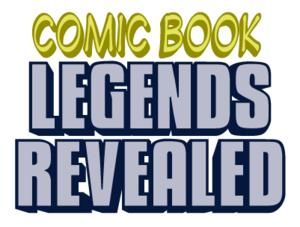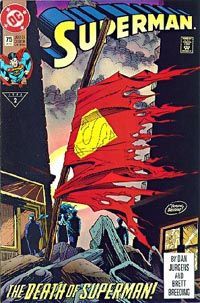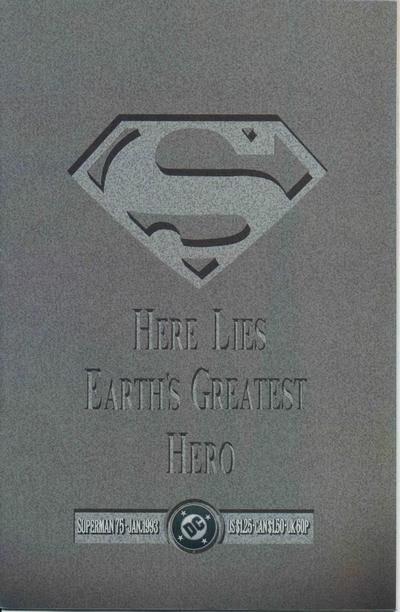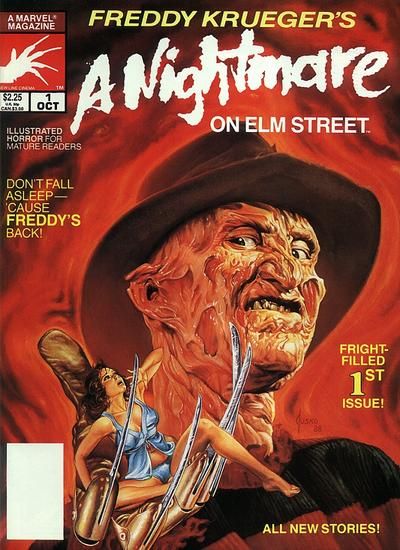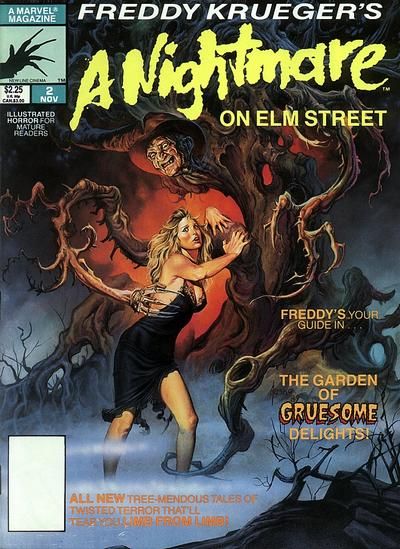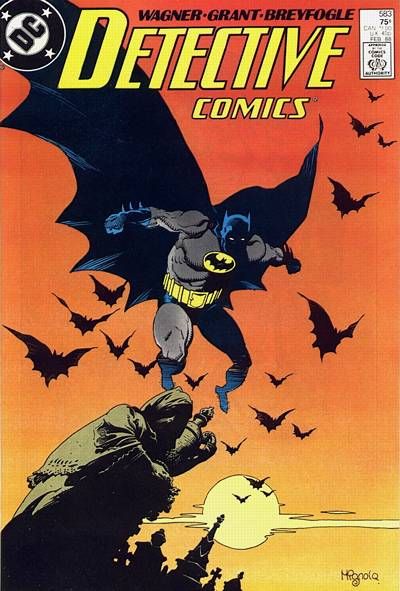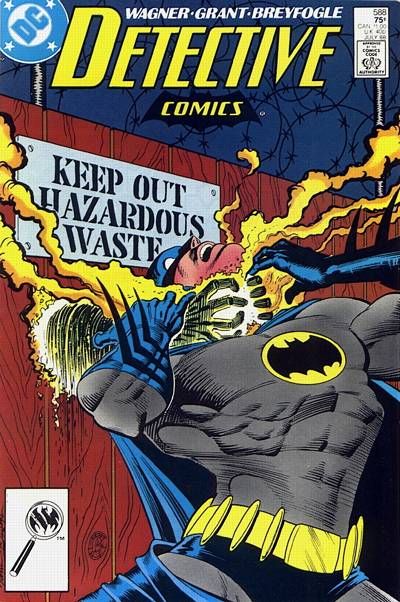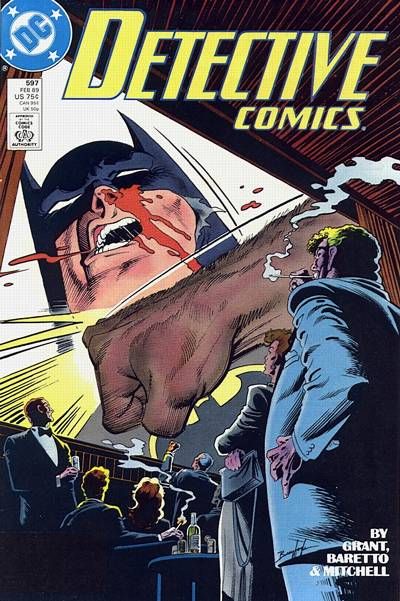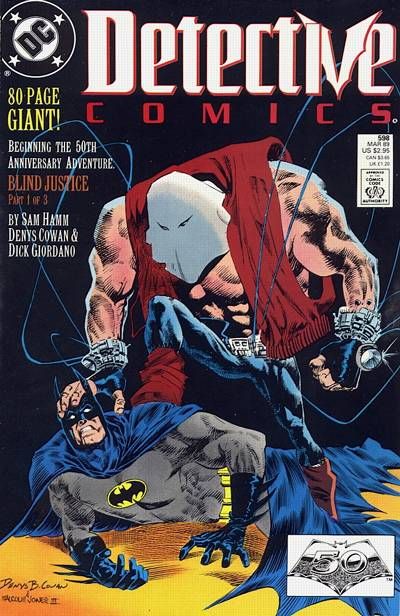This is the ninety-fifth in a series of examinations of comic book urban legends and whether they are true or false. Click here for an archive of the previous ninety-four. Click here for a similar archive, only arranged by subject.
Let's begin!
COMIC URBAN LEGEND: DC had no idea that the Death of Superman would be such a big deal.
STATUS: Close call...I guess part False/part True
In a recent interview with Jonah Weiland the other week, speaking about the death of Captain America, Joe Quesada said the two magic words - "urban legend" - which totally piqued my interest.
Here is what Joe had to say:
I was not at DC when the "Death of Superman" happened, but as I understand from what I've heard, like some sort of global urban legend, was that DC really had no idea that the Death of Superman was going to be so big and that it hit on a slow news day. It's probably a story that [DC Editor] Mike Carlin could tell better, and I've never spoken with Mike about it directly, but if you take that urban myth - and it may be truth but I'm calling it that only because I've never spoken to anybody directly about it - then it's best to be prepared for this type of thing. Overall, at the end of the day, I think Marvel as a publishing division is well prepared for this kind of thing, this kind of media assault, because we've had a lot of experience with doing it.
The problem with really giving this urban legend a proper true or false is the fact that there really are two sides to what Quesada is saying here.
On the one hand, if the statement is just simply - "If there was a bigger story that day, Superman's death wouldn't have been as big of a deal", then the answer would be a resounding true. Mike Carlin even responded to my inquiry (thanks, Mike!) with as much, "I have long said that if there was a war, or Madonna had had a baby that day-- nobody would have cared."
However, if the statement is "DC had no idea that the Death of Superman was going to be so big," then I think it is a bit false, as DC gave the Death of Superman the front cover of Previews months before it was released, and announced his death at the BEGINNING of 1992 at a retailer event.
Plus, when DCs' publicist Martha Thomases was pushing this story to newspapers and the like, there really wasn't anything like this to compare it to, so when Thomases got the story to get a full page of New York Newsday, that was actually a big deal back in 1992.
In addition, DC printed a whole pile of Superman #75's - although they ended up not being enough when all was said and done (as I think the book had something like four printings), they still had a LOT of copies ready for readers.
All in all, though, if Quesada's point (and I think it most likely was this) was just that, no matter how big DC thought Superman was going to be, it was much bigger than that - then I think he's dead on. But if the point of the urban legend was that DC was unprepared for the media storm (and I do not believe that's what Quesada is saying here, but that is a common belief regarding this particular urban legend) - then that is not accurate.
So, a little bit of True and a little bit of False. Okay, mostly true, with a little false mixed in there.
COMIC URBAN LEGEND: Marvel's president once canceled a movie tie-in comic mid-series once he realized what the movie was about.
STATUS: True
In 1989, Marvel released a tie-in to the film Nightmare on Elm Street...
Steve Gerber wrote the main stories for the first two issues, which were well received (and the book itself was a nice seller), but the book was pulled after the second issue, with three full issues of material already completed, including stories by writers Buzz Dixon and Peter David.
As it turns out, Marvel President Terry Stewart had not seen the book until the first issue was already out (and the second issue already ready for publication). After reading it, Stewart was highly disturbed by the content of the first issue, so he asked to see the other issues as well, and seeing that they all were basically the same as the first issue, he quickly balked at the idea of Marvel publishing a comic about a psychotic child killer, so he canceled the remaining issues and got Marvel out of the licensing deal they had with New Line Productions.
Thanks to Steve Gerber, Buzz Dixon and Tom Brevoort for filling me in on the details of this one.
COMIC URBAN LEGEND: Alan Grant wrote most of his first year on Batman crediting a writing partner who wasn't working with him.
STATUS: True
In yet another nifty Daniel Best interview for Adelaide Comics and Books, Best talked to Alan Grant and Norm Breyfogle about their run on Batman together (spanning THREE different titles!), and specifically the rather peculiar credits system with Grant and his sometimes writing partner, John Wagner:
Alan Grant: John and I were working on Judge Dredd one day when we got a call from Denny O'Neil. Denny was saying that basically Detective Comics was selling below its break even point, they were making a loss on it as opposed to a profit, and there was talk of closing it down unless he could turn it around. He had the bright idea of giving it to a couple of Brits and seeing if we could come up with different stuff. He basically gave us a two issue trial and that's when we used the Ventriloquist, which we had actually created for another story in 2000AD, but we used it in Batman instead.
Denny liked the two issues and signed us up for a year. At that time you didn't get royalties working for any British comics and John and I were looking forward to getting some royalties on Batman because American writers and artists got royalties depending on the sales. After five months or so the first royalty statements came in and the sales were still below break even and there were no royalties. John took one look at it and quit.
Basically John and I wrote five issues together, and I wrote all the rest of the run on my own. I kept John's name on the comic for the rest of the first year because we had signed a contract and I didn't want to give DC any excuse to fire me.
Norm Breyfogle: Oh wow, I didn't know that, or if I did I forgot.
Grant: That's a long time ago now Norm.
Breyfogle: That's true. Did John ever tell you later on that he wished he'd stayed?
Grant: John could never bring himself to say it, but I could see the sick look in his eyes when I showed him some of the royalty cheques that I got from Batman. After the Burton movie came out and sales went into the stratosphere, royalties went up amazingly.
Breyfogle: Do you remember what the sales point, what the break even point was in numbers?
Grant: When we first started on it, it was 80,000 per month and Detective was selling 75,000.
Grant's first issue "solo" was Detective Comics #597.
The funny thing is that he was then taken OFF the book for the next three issues to allow the screenwriter of the Batman film, Sam Hamm, to write the next three issues, including the 600th issue, which you could quite imagine, did quite well, royalties-wise.
Okay, that's it for this week!
Feel free to drop off any urban legends you'd like to see featured!

